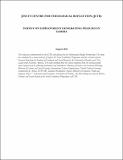| dc.contributor.author | Jesuit Centre for Theological Reflection | |
| dc.date.accessioned | 2020-12-15T08:02:19Z | |
| dc.date.available | 2020-12-15T08:02:19Z | |
| dc.date.issued | 2011-08 | |
| dc.identifier.uri | https://repository.jctr.org.zm/handle/20.500.14274/138 | |
| dc.description | The background to the study was informed by the stark reality that Zambia is among many developing countries struggling to create adequate formal employment opportunities for its people. For instance, while the labour force grew by about 4.2% over the period 2000 to 2005 (i.e. rising from 4.7 million in 2000 to 4.9 million in 2005), formal employment only grew by 1.7% over the same five year period, i.e. rising from 487,340 in 2000 to 495,784 in 2005(CSO, Labour Force Survey 2005). Incidentally, Zambia’s annual economic growth rate averaged about 5% for the period 2000 - 2005 and has since grown to average between 5% and 7% in the last five years (GRZ, Economic Report, 2009; Budget Address, 2011). Ironically, this growth appears to have
very little impact on the generation of adequate formal employment opportunities. Besides, Zambia has in the recent past given up substantial amounts of financial resources that might have accrued to the national treasury from tax holidays and waivers that are offered to attract foreign private investment. Arguably, the benefits of such investment in relation to formal employment creation remain unclear. On the other hand, the quality of the limited levels of formal employment being generated has come under heavy attack by the labour movement and civil society organisations on account of decent work deficits. However, the achievement of higher levels of quality formal employment ought to be a national concern. While Civil Society Organisations (CSOs) and other stakeholders have been calling for an increase in the levels of formal employment, the advocacy campaigns
have not been consistent or grounded on a concrete understanding of the various policies and institutions dealing with the employment challenge in Zambia. This knowledge gap limits the effectiveness of advocacy work. Thus, closing this gap was seen as a necessary step in identifying corrective measures and strategies for going forward | en |
| dc.description.abstract | The basic fact that low income households possess few assets of their own can hardly be contested. The most abundant resource at the disposal of the poor is their labour. Thus, a development strategy that more fully employs a country’s human resources and raises the returns to labour becomes a powerful tool for raising household incomes and reducing poverty (World Bank, 2001). In other words, when employment expands along with production, the benefits of economic growth will be widely shared. However, despite the numerous attempts by the Government to promote formal employment in Zambia, it is very
clear that change is happening at a snail’s pace. Besides, there has been growing concern among the citizenry regarding the quality of employment that has resulted from recent efforts at employment generation, particularly in the context of foreign private investment driven job creation thrusts. It is, therefore, important for policy makers, business houses and civil society organizations to begin to act on present possibilities to ensure that formal employment, both in terms of quantity and quality is prioritized in Zambia. This report draws on a study undertaken by the Jesuit Centre for Theological Reflection (JCTR) that sought to understand the policies, strategies and practices currently being undertaken by the Government of the Republic of Zambia in generating formal employment. Admittedly, a question would arise as to why the focus of this study was on formal employment when the nature of employment in Zambia includes informal employment. This was deliberate precisely because Zambia’s formal employment is closely associated with work that generally meets decent work standards i.e. work that guarantees
adequate income, social protection, the respect of fundamental rights and principles at work as well as social dialogue (ILO, 2008:7). Besides, it is the case that Zambia provides substantial investment incentives whose benefits in relation to formal employment creation remain unclear. Thus, understanding why formal employment is moving at a snail’s pace despite substantial investment incentives provided by Government required a more focussed investigation. | en |
| dc.language.iso | en | en |
| dc.publisher | Jesuit Centre for Theological Reflection | en |
| dc.rights | Attribution-NonCommercial-ShareAlike 3.0 United States | * |
| dc.rights.uri | http://creativecommons.org/licenses/by-nc-sa/3.0/us/ | * |
| dc.subject | Employment | en |
| dc.subject | Labour | en |
| dc.title | Survey on Employment Generating Policies and Strategies in Zambia | en |
| dc.type | Other | en |

